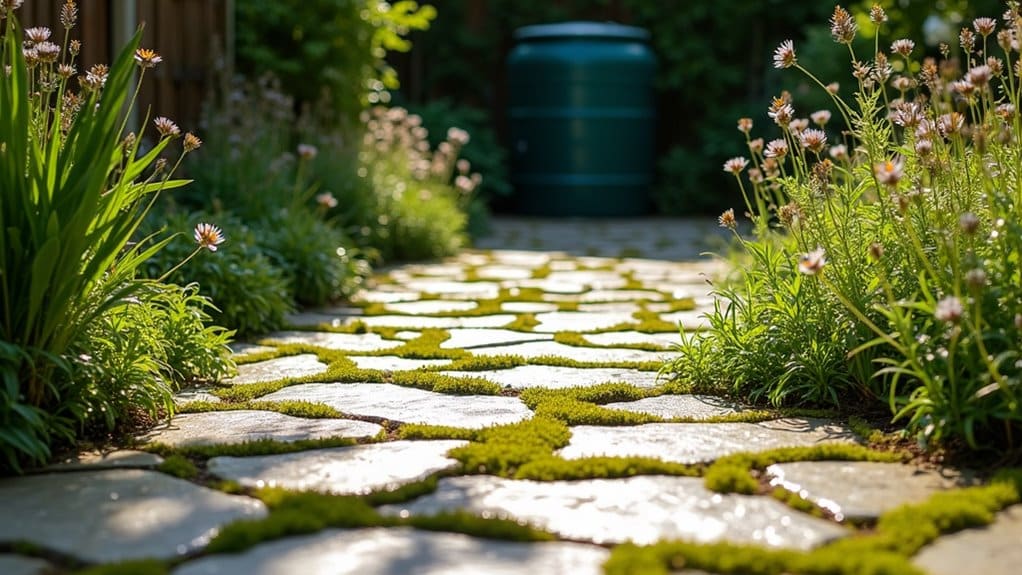Eco-friendly permeable paving offers a practical solution for managing British weather, particularly our frequent rainfall. These systems allow water to seep through the surface naturally, reducing puddles and flooding risks whilst topping up groundwater levels. Common options include porous concrete and recycled plastic grids, which work brilliantly for driveways, garden paths and car parks.
Though costlier upfront than traditional paving, these surfaces need minimal upkeep and can save money by preventing drainage issues. They’re particularly useful in areas prone to surface water, like Manchester or Cornwall, where heavy rainfall is common. Plus, they help filter out nasty pollutants before they reach our waterways.
For UK homeowners, permeable paving ticks both practical and environmental boxes – you’ll have a sturdy surface that handles our wet climate whilst doing your bit for local wildlife and reducing flood risks. Worth considering if you’re planning to update your driveway or patio.
Key Takeaways
Permeable paving tackles Britain’s rainy weather head-on by soaking up surface water and cutting flood risks. It filters out nasty pollutants before they reach our waterways, making it a brilliant eco-choice.
Built from green materials like porous concrete and recycled plastics, these pavers cost between £2.50 and £25 per square foot. While that might seem steep initially, you’ll save money long-term with less maintenance and fewer repairs needed.
These surfaces work brilliantly everywhere – from driveways and patios to car parks and walkways. Beyond boosting your property value, they create habitats for local wildlife and help your garden thrive.
Getting the right permits and following council guidelines ensures proper installation. It’s a smart investment that helps both your property and our environment, especially given the UK’s increasingly unpredictable weather patterns.
Benefits of Permeable Paving
Permeable paving delivers key environmental, safety and economic benefits for modern infrastructure. Its main advantage lies in managing stormwater effectively. The surface allows water to soak into the soil, reducing flood risks and erosion common in British weather. As water filters through, it removes pollutants, improving water quality and topping up groundwater supplies. Additionally, permeable paving helps to reduce stormwater runoff, capturing and draining water into the soil. Furthermore, using permeable materials supports Sustainable Drainage Systems, which promote effective rainwater management.
Safety-wise, permeable surfaces offer better grip in wet conditions, particularly useful on British driveways and car parks. They reduce ice build-up in winter, lowering the risk of slips and falls. The robust structure handles heavy loads well, making it ideal for busy areas, whilst needing less upkeep than traditional surfaces.
The economic benefits are substantial. Permeable paving cuts infrastructure costs by reducing the need for traditional drainage systems. Many local councils offer incentives for sustainable building practices.
It also requires less grit and salt in winter, cutting costs and environmental impact. These practical advantages make permeable paving a sound investment for sustainable property management in the UK.
Material Composition of Eco-Friendly Pavers
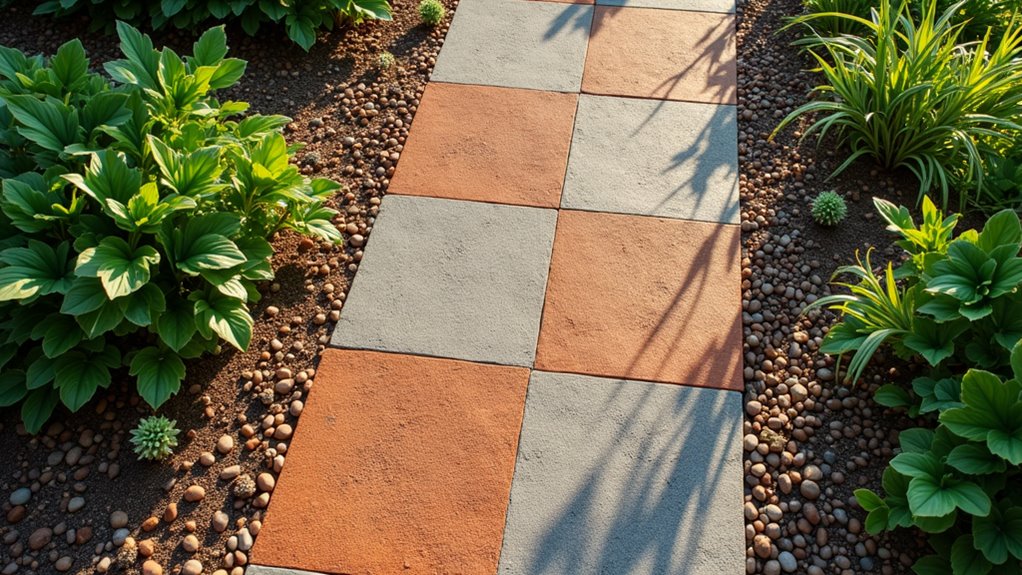
The material makeup of eco-friendly pavers plays a vital role in their performance and environmental impact. These pavers are mainly built from permeable materials, including porous concrete, permeable interlocking concrete pavers (PICP), recycled plastics and washed stones. Their design allows rainwater to seep through, significantly cutting down on surface water runoff – a common issue in British gardens and driveways.
Many eco-friendly pavers incorporate recycled materials, such as recycled polyethylene and post-consumer plastic waste, similar to what you’d find in recycled plastic garden furniture. This approach reduces landfill waste whilst supporting sustainable manufacturing. Additionally, the use of permeable materials in their construction enhances their ability to facilitate natural filtration and reduce flooding risk.
The production focuses on responsible material sourcing, particularly with recyclable concrete and waste minimisation.
These pavers feature wider joints filled with porous materials like angular stone, which helps water drain naturally into the ground. UK manufacturers follow strict environmental guidelines and often use post-industrial waste in their production.
Quality testing and warranties back their durability claims. Choosing eco-friendly pavers delivers an effective balance of kerb appeal, practical function and environmental care – particularly useful for areas prone to flooding or where councils require sustainable drainage solutions.
Environmental Advantages
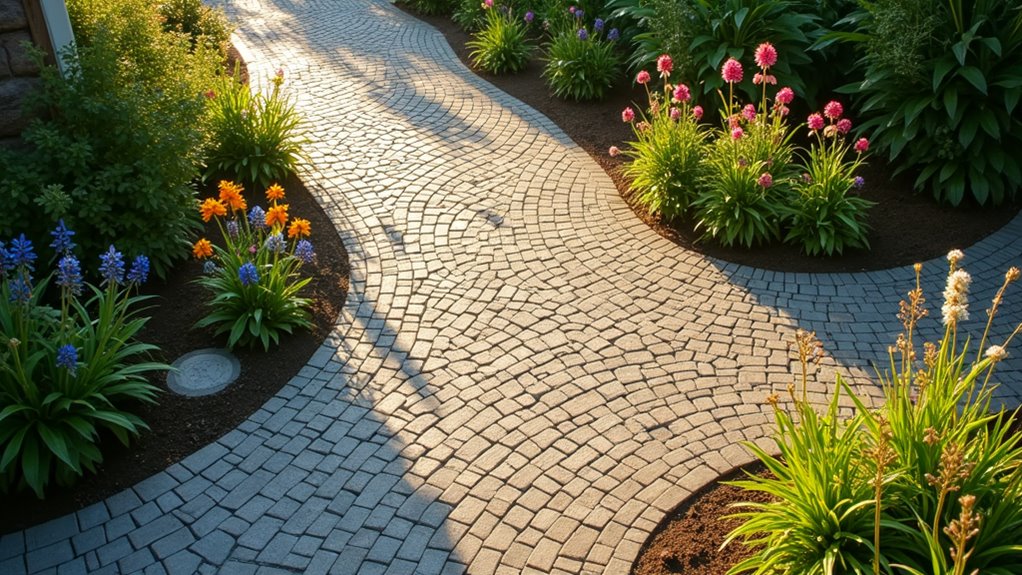
Eco-friendly pavers boost your outdoor space’s appeal whilst offering major environmental benefits.
These clever solutions manage stormwater effectively by letting water seep through the surface, which cuts down on flooding risks and soil erosion. This natural drainage helps maintain healthy water tables and reduces strain on local sewers. Notably, permeable pavers can store up to 3,000 gallons of water under a 1,000-square-foot area, which aids in replenishing groundwater. Additionally, resin-bound systems enhance drainage further, making them an ideal choice for eco-friendly paving.
These pavers also excel at filtering pollutants. When rain passes through the surface, harmful substances get trapped in the sub-base, where naturally occurring bacteria break them down. This means cleaner water flows into our streams and rivers.
The pavers help tackle the urban heat island effect by staying cooler than traditional paving materials like tarmac or concrete.
They’re brilliant for water conservation too, helping replenish groundwater and collect rainwater for garden use.
Installing eco-friendly pavers isn’t just about looks – it’s a practical step towards protecting our environment and creating healthier communities.
Cost and Maintenance Considerations
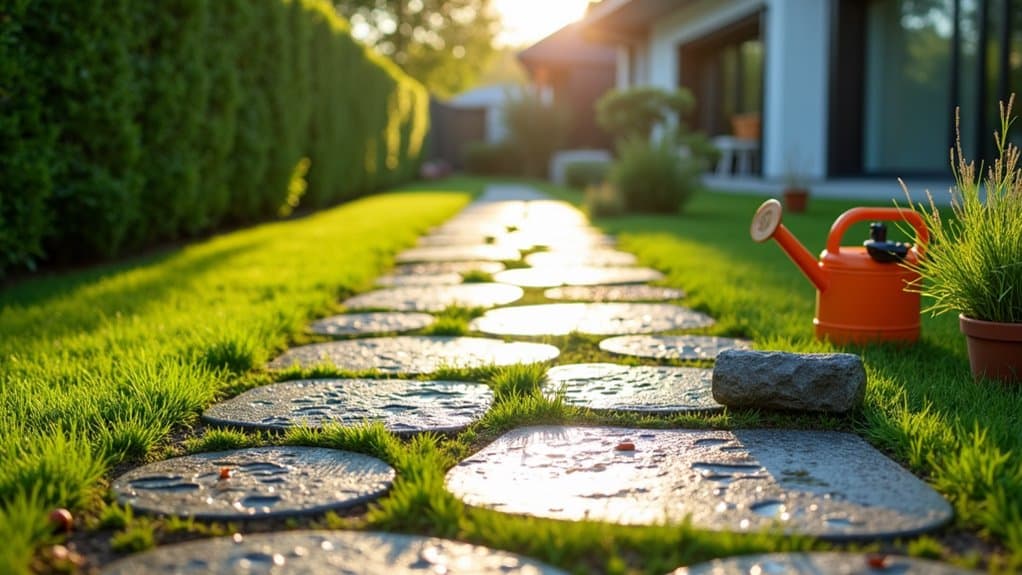
Initial costs for permeable paving vary by type. Permeable block paving typically costs £8-£25 per square foot, whilst pervious concrete ranges from £6-£13 per square foot. Though costlier upfront than traditional surfaces, these solutions offer notable long-term savings through reduced maintenance.
The upkeep is straightforward. Most permeable surfaces need only occasional vacuuming and pressure washing to maintain effectiveness. Annual maintenance costs run between £80-£400, depending on the installation size and material choice. Regular maintenance is essential to prevent clogging issues, which can affect performance over time, especially considering that resin-bound surfaces in comparable systems can significantly enhance durability.
The robust nature of permeable paving means less frequent resurfacing compared to standard materials, cutting long-term costs. Whilst the initial investment might seem steep, the environmental benefits and minimal maintenance make it a sound choice for UK properties. The added advantage of meeting local planning requirements for sustainable drainage often justifies the expense.
These surfaces work particularly well in British weather conditions, helping manage heavy rainfall whilst reducing puddles and ice formation in winter – common issues in the UK climate.
Versatile Applications for Properties
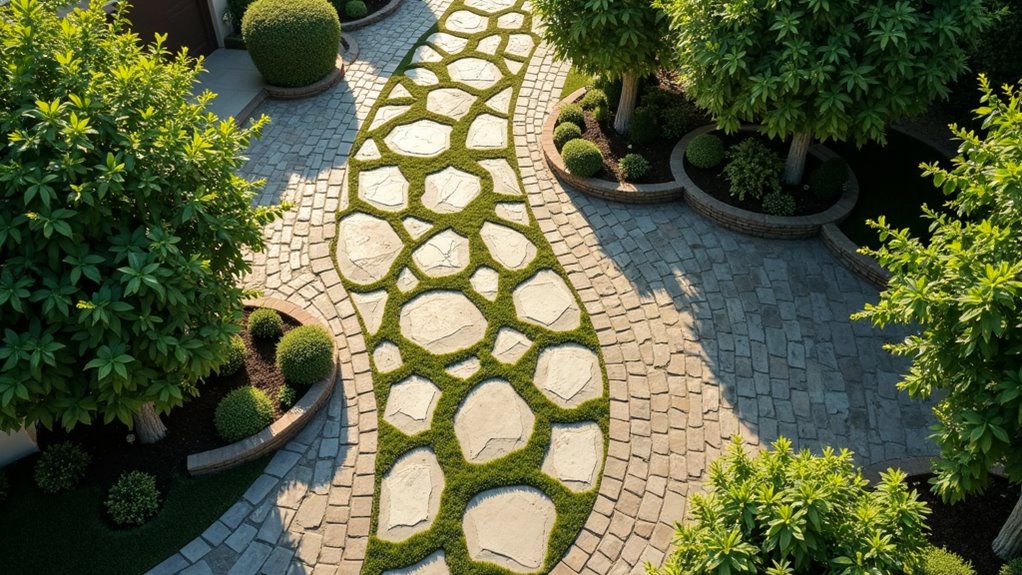
Versatile Applications for Properties
Permeable paving solutions work brilliantly across both residential and commercial properties, offering practical benefits whilst promoting sustainability.
Four key applications include:
- Driveways: Permeable pavers reduce surface water flooding, perfect for UK homes where rainfall is frequent and drainage often challenging. This investment in permeable paving contributes to environmental sustainability and helps reduce risks associated with flooding.
- Walkways and Pedestrian Areas: These systems provide safer, more attractive paths whilst managing rainwater effectively – particularly useful for high-traffic commercial areas. The permeable design also enhances the longevity of the surface, making it a cost-effective solution.
- Parking Lots: Permeable surfaces in car parks reduce overheating, improve air quality and handle Britain’s notorious wet weather efficiently. Their resilience to cracking under heavy traffic ensures long-term durability.
- Public Spaces: Town squares and community areas benefit from permeable paving, supporting local biodiversity and creating more sustainable urban spaces. With their non-slip properties, these pavings also contribute to safety in wet conditions.
Permeable paving tackles both practical and environmental challenges head-on.
Whether it’s preventing puddles on your home driveway or managing rainwater in a busy town centre, these solutions deliver real benefits for UK properties.
The approach makes perfect sense in our climate, offering sensible solutions for modern building needs whilst supporting environmental goals.
Sustainability and Impact

Sustainable paving delivers both environmental benefits and practical value for your property.
Permeable surfaces made from recycled plastic waste offer an eco-friendly alternative that significantly reduces environmental impact. These solutions strengthen ground stability, prevent soil erosion and manage rainfall effectively, allowing water to naturally seep into the ground to replenish water tables and support local plant life. Additionally, this innovative approach utilises 100% recycled LDPE to create paving solutions that align with sustainability goals.
These surfaces help combat urban heating by enabling water evaporation to cool surrounding areas. The materials are safe for local wildlife and contribute to a healthier environment.
For commercial properties, sustainable paving can help achieve LEED certification, potentially boosting property value.
Compared to traditional paving, these solutions require less upkeep and last longer, cutting future maintenance costs whilst protecting your landscape.
Quality Assurance and Certifications

Warranties and environmental standards play a vital role in choosing sustainable paving solutions.
Most eco-friendly pavers, such as those made by Ecoraster, come with robust warranty coverage and can withstand substantial weight loads. Additionally, many of these materials, including permeable pavers, help reduce water runoff and improve soil health.
Look for products that meet UK and EU environmental certifications – this ensures your paving choice delivers both reliable performance and genuine environmental benefits.
When comparing options, check for BBA certification and compliance with BREEAM standards, as these are key markers of quality in the British construction sector.
Warranty and Longevity
Ecoraster: Warranty and Long-Term Performance
When you choose Ecoraster for your paving needs, you’re investing in a sustainable solution with proven reliability. The 20-year warranty reflects the manufacturer’s confidence in the product, which has demonstrated its effectiveness for over 25 years in real-world applications. Additionally, the use of recycled materials in Ecoraster pavers contributes to a more sustainable landscaping approach.
Key warranty and durability features:
- RAL testing certification ensures consistent quality and performance
- Load-bearing capacity of 800 tonnes/m², suitable for heavy vehicle areas
- Weather and UV-resistant materials stand up to British climate conditions
- Approved by leading organisations including FEMA and the Army Corps of Engineers
The comprehensive warranty covers structural integrity and performance, making Ecoraster a sound investment for both residential and commercial projects.
Whether used for car parks, driveways or emergency access routes, the system maintains its strength and functionality throughout its service life.
Environmental Certifications Overview
Environmental certification backs Ecoraster’s durability and sustainability credentials through rigorous third-party validation. These certifications ensure permeable paving materials meet strict environmental standards whilst maintaining quality.
Essential eco-friendly paving certifications:
| Certification | Key Focus Areas | Benefits |
|---|---|---|
| LEED Certification | Sustainable Sites, Water Efficiency | Boosts property value |
| Recycled Content | Use of recycled materials | Minimises landfill waste |
| Green Seal | Eco-friendly materials and processes | Ensures product safety |
| Energy Star | Energy efficiency in manufacturing | Reduces running costs |
Like the British Standard kitemark for safety, these certifications offer clear evidence of environmental responsibility. For example, LEED certification helps property developers meet increasingly strict environmental performance UK building regulations, whilst recycled content certification demonstrates commitment to the circular economy.
Regulatory Compliance Standards
Navigating Regulatory Standards for Permeable Paving
Understanding compliance standards is vital for ensuring quality permeable paving installations in the UK. The key certifications include:
- Building Standards Compliance: Must meet UK accessibility requirements and building regulations.
- Environment Agency Approval: Essential for flood risk areas and drainage solutions.
- BREEAM Certification: Supports sustainable construction targets and water management.
- British Standards Institution (BSI): Confirms product quality and durability standards.
These certifications boost product credibility whilst meeting environmental guidelines for pollution reduction and groundwater management. Additionally, many permeable paving systems, such as the EasyPave Gravel & Grass Driveway Grid, are designed to prevent soil erosion and promote grass growth, making them compliant with sustainability practices.
Regular checks of current regulations ensure compliance with local planning requirements. Choosing properly certified products helps deliver sustainable, long-lasting permeable paving solutions.
Local councils often require specific standards, so it’s worth checking your area’s requirements before starting any installation.
For example, Yorkshire Water and Thames Water have different specifications for permeable surfaces in their regions.
Comparison With Traditional Paving
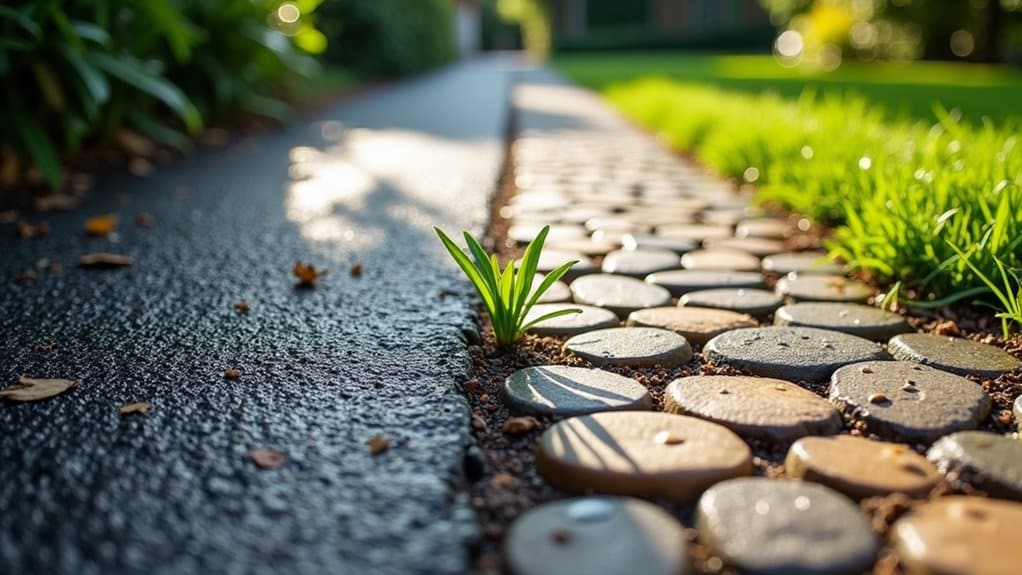
Comparing Eco-Friendly and Traditional Paving
Traditional concrete and asphalt paving differ markedly from modern permeable solutions. Standard surfaces cause excessive water runoff, often leading to localised flooding and strain on drainage systems across UK towns and cities. Permeable paving, however, allows rainwater to soak through naturally, helping maintain groundwater levels and supporting local ecosystems. This is particularly crucial given that urbanisation drives demand for effective stormwater solutions. Moreover, permeable materials, like resin driveways, can be installed quickly in one day, minimizing disruption to both residential and commercial settings while contributing to the overall durability of paved surfaces.
Whilst traditional materials might cost less initially, they often require more extensive maintenance over time. Common issues include cracking during harsh winters and the need for frequent repairs.
Permeable options typically last longer and reduce the need for complex drainage installations, proving more cost-effective long-term.
The visual appeal of permeable paving stands out compared to conventional surfaces. Whether used for driveways or town centre developments, these materials offer various design choices that can boost property values.
They’re particularly effective in urban areas, where they help reduce the heat island effect – a growing concern in British cities during increasingly warm summers.
The decision between permeable and traditional paving affects both individual properties and the wider community.
With Britain’s frequent rainfall and growing environmental awareness, permeable solutions offer practical benefits that extend beyond mere aesthetics.
Innovations in Eco-Friendly Paving

Modern Eco-Friendly Paving Solutions
British communities are shifting away from traditional paving methods towards sustainable alternatives that tackle both environmental issues and practical needs.
New paving technologies focus on sustainability without compromising on strength and longevity. Many of these innovations significantly lower carbon footprint while maintaining durability, similar to the advantages offered by resin driveways.
Four significant eco-friendly paving innovations:
- Permeable Pavements: These surfaces let water filter through naturally, cutting down on surface water and helping replenish groundwater – particularly useful for Britain’s rainy climate.
- Recycled Plastic Paving: Made from waste plastic, these tough blocks need little upkeep and help tackle the UK’s plastic waste problem. They’re already being tested in several council areas.
- Rubberised Asphalt: Mixing ground-up old tyres with asphalt creates a more durable surface that reduces road noise – ideal for residential areas and high-traffic zones.
- Glassphalt: Created using crushed recycled glass, this material reflects light better and lasts longer than traditional surfaces, making it perfect for car parks and urban spaces.
These innovations offer practical solutions for British property owners whilst supporting environmental sustainability.
Choosing these modern paving options helps create greener communities and improves local infrastructure.
Installation Process Overview
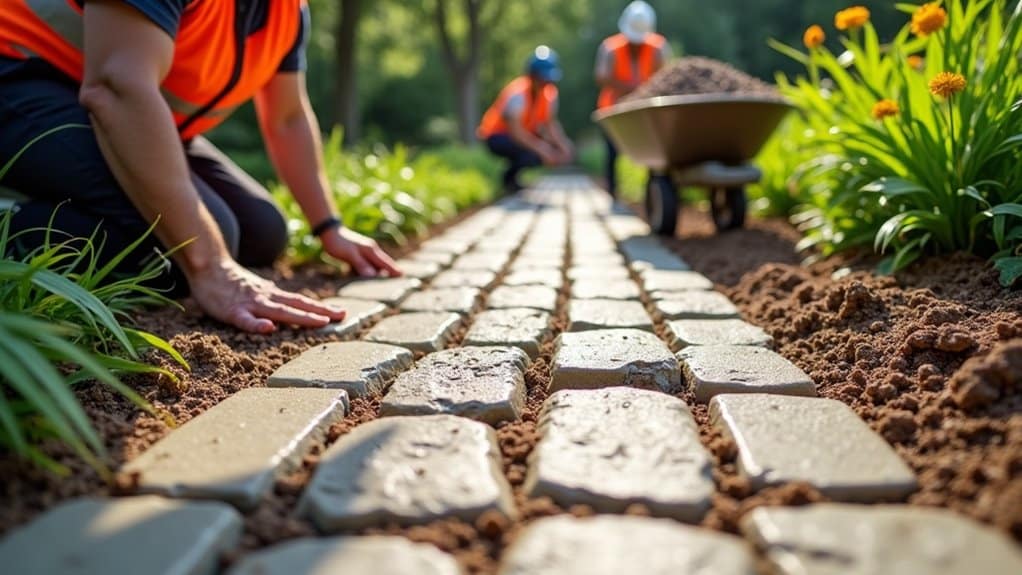
Step-by-Step Installation of Eco-Friendly Paving
Proper installation of eco-friendly paving is vital for lasting results. Start with a thorough site check to assess soil type, drainage and distance from buildings. This initial assessment helps determine your approach and confirms whether the site suits permeable pavers.
Dig the area to 30-45cm below the finished level, removing any existing paving to ensure proper drainage. Select appropriate materials, including geotextile fabric, different grades of aggregate and suitable pavers for your specific conditions.
Lay geotextile fabric to stop soil mixing with the base layers, then build up the aggregate layers. Use coarse aggregate for the foundation, followed by fine aggregate to create a smooth laying course.
Set the pavers in your chosen pattern, cutting them to fit edges where needed. Permeable pavers facilitate outdoor residue flow, preventing floods and enhancing groundwater replenishment through natural filtration. Fill gaps with jointing material and compact gently to ensure level settling.
Test how well water drains through the system, let it settle, and maintain regularly to keep it working properly.
Best suited to UK driveways and garden paths, this method works particularly well in areas prone to surface water. Local councils often favour these solutions for their sustainability and flood prevention benefits.
Choosing the Right Paving Solution

Choosing the right paving needs careful thought about materials, costs and how long it’ll last.
Whether you’re sorting the driveway or redoing your garden path, each material – from traditional block paving to modern resin-bound surfaces – brings different environmental considerations. Notably, resin bound paving offers a smooth, permeable finish that enhances drainage and minimizes runoff. Take block paving: it’s sturdy and lets rainwater drain through, whilst concrete might be cheaper but could crack in harsh winters. Permeable paving solutions can enhance drainage capabilities and reduce runoff, making them a sustainable choice for your property.
A proper assessment of these factors helps you pick something that works for your budget and doesn’t harm the environment.
Material Considerations
Material Considerations
Selecting the right paving requires careful thought about materials that balance environmental impact with practical use. Key factors include water drainage, longevity and visual appeal.
Four notable options include:
- Grass Driveway Pavers – Allow natural drainage whilst creating an attractive green space. Popular in residential areas where sustainable drainage is essential.
- Recycled Asphalt – A cost-effective choice that reuses existing materials, reducing landfill waste. Commonly used for driveways and car parks.
- Natural Stone – Locally-sourced options offer minimal environmental impact with classic British kerb appeal. Ideal for paths and patios.
- Ecoraster Grids – Made from recycled plastic, these grids support healthy soil structure and effective water management. Well-suited to both domestic and commercial settings.
Installation methods vary significantly between materials. Some require professional fitting, whilst others suit DIY projects. Additionally, the non-porous nature of traditional asphalt and concrete can lead to significant groundwater runoff issues, emphasizing the need for permeable solutions.
The final choice should match your practical requirements and desired look, creating an environmentally responsible solution that enhances your property.
Cost and Longevity
Cost and longevity are vital when choosing a paving solution. For permeable options, installation costs vary significantly.
Permeable pavers cost £8-£24 per square metre, whilst porous concrete ranges from £6-£12. For those on a tighter budget, plastic grid and grass pavers start at £2.50-£7 per square metre. The average installation cost for permeable pavers is around $7,500, which can be influenced by various factors.
Lifespan matters too. Well-maintained permeable pavers and pervious concrete last 20-30 years, making them sound long-term investments.
Porous asphalt typically lasts 10-20 years but needs resurfacing, which adds to overall costs.
The right paving should look good and work well year-round in British weather. Grass pavers offer a natural appearance that suits many UK gardens whilst providing decent durability.
The best choice balances your budget with expected lifespan and looks.
Environmental Impact
Environmental Impact
Choosing the right paving solution goes beyond looks and durability – it’s crucial to consider environmental effects. Permeable pavements offer significant ecological benefits and help manage rainwater effectively.
Four key environmental advantages:
- Stormwater Management: Permeable surfaces reduce water runoff and flooding by allowing rain to soak into the ground, helping replenish natural water tables. This also contributes to maintaining balanced water cycles, which is essential for ecosystem health.
- Natural Filtration: The surfaces trap pollutants and contaminants, much like a water filter, improving the quality of local water systems.
- Urban Heat Reduction: These pavements cool urban areas by allowing water evaporation, particularly useful in city centres where temperatures tend to be higher.
- Wildlife Support: Permeable paving systems often incorporate green spaces, creating valuable habitats for local wildlife and plants.
Opting for permeable paving is a practical choice that benefits both property value and the environment.
It’s particularly relevant for British properties, where frequent rainfall makes effective drainage essential. These solutions actively support local ecosystems while managing our often-challenging weather conditions.
Frequently Asked Questions
Can Permeable Pavers Be Installed on a Slope?
Permeable pavers work well on slopes, provided proper measures are in place. Think of a typical British driveway – you’ll need sturdy edge restraints (like those commonly used in council car parks) and careful base preparation to ensure stability. It’s crucial to grade the base correctly and install proper drainage, much like preparing a garden path on a hill. Whilst steeper slopes require extra attention, most residential gradients are perfectly manageable with the right installation approach.
Are Permeable Pavers Safe for Pets and Children?
Research indicates that 70% of pet accidents happen in outdoor spaces. Permeable pavers offer a safe solution for both pets and children, featuring non-toxic materials, slip-resistant surfaces and smooth edges. These qualities make them particularly suitable for family gardens and driveways across the UK.
How Do Permeable Pavers Handle Heavy Vehicle Traffic?
Permeable pavers cope well with heavy vehicle loads, including lorries and coaches. The key is proper installation with the right sub-base depth and aggregate choice. Regular maintenance is vital – sweep the surface periodically and check for any loose stones or settling, much like you’d maintain a typical car park surface. For best results, think of these pavers as similar to traditional block paving, just with added drainage benefits.
Do Permeable Pavers Require Special Drainage Systems?
Permeable pavers require proper drainage systems for optimal performance. A well-designed sub-base and adequate drainage layers are essential for British weather conditions. Think of it like a multi-layer tea strainer – each layer helps filter and direct water efficiently into the ground. Regular maintenance, such as sweeping and occasional pressure washing, keeps the system working properly and prevents autumn leaves and debris from blocking the drainage channels.
Can I Install Permeable Pavers Myself?
Installation of permeable pavers is a viable DIY project, but proper technique is essential. Ensure thorough ground preparation, use appropriate compacting methods and select suitable materials for British weather conditions. A proper sub-base of crushed stone is crucial for drainage. Regular maintenance, including annual clearing of debris and reapplying jointing material, keeps the pavers working effectively year-round.
Conclusion
Installing permeable paving on your property makes sound environmental sense whilst adding value to your home. These innovative surfaces reduce water runoff, prevent flooding and blend seamlessly with your garden design. Rather than watching rainwater pool on standard paving, permeable solutions allow it to drain naturally into the ground. Whether you’re revamping your driveway or creating a new garden path, these eco-friendly materials offer practical benefits for both your property and the wider environment.
